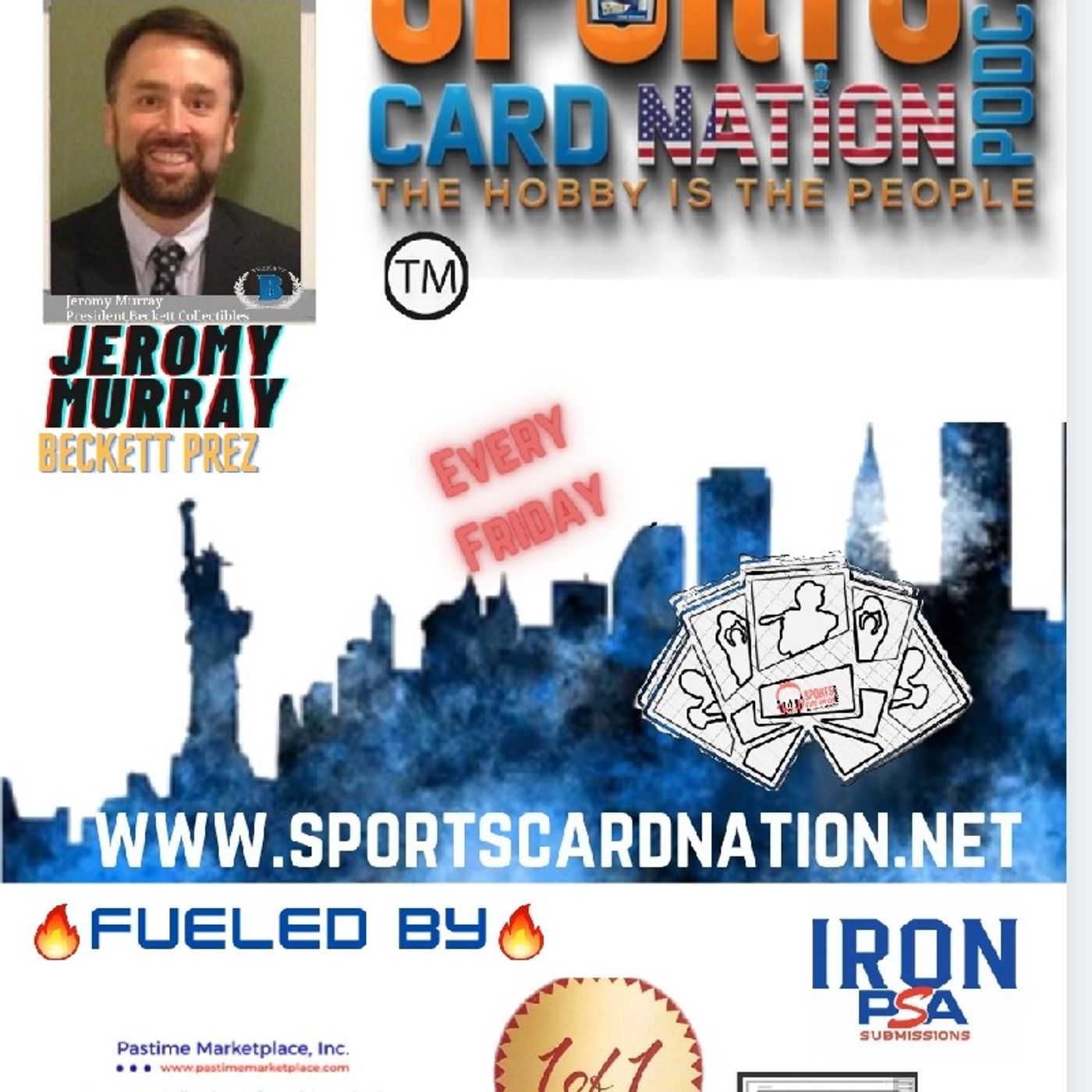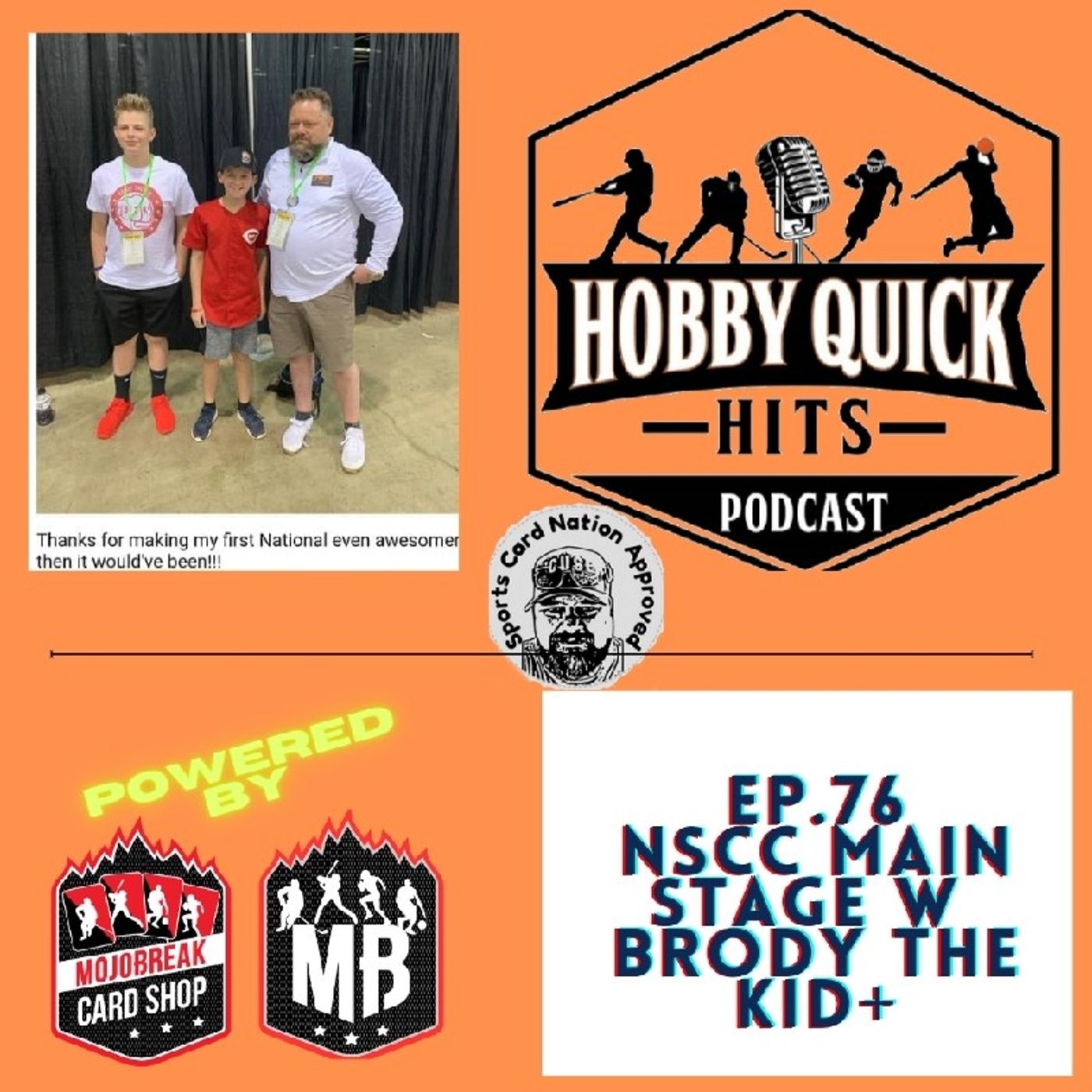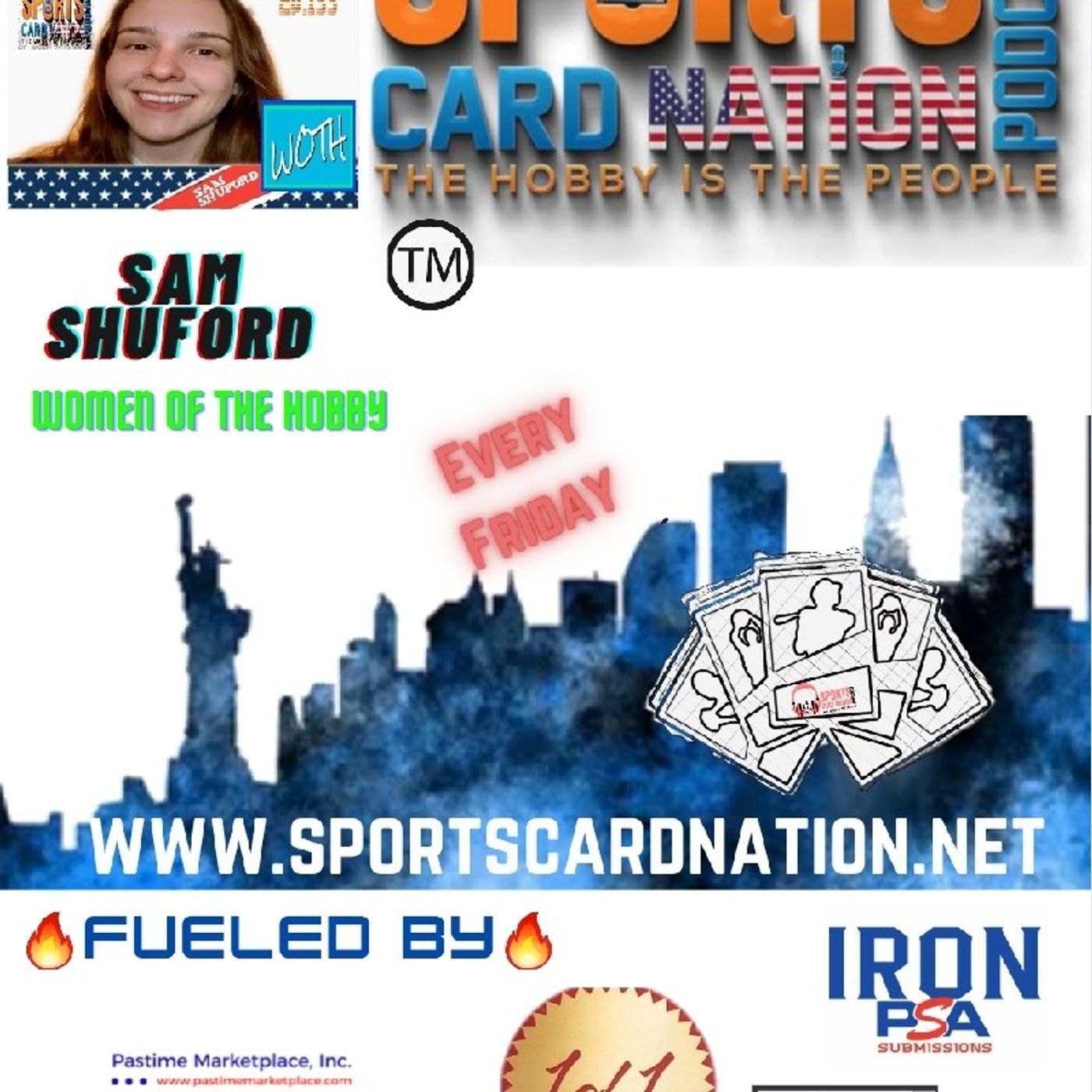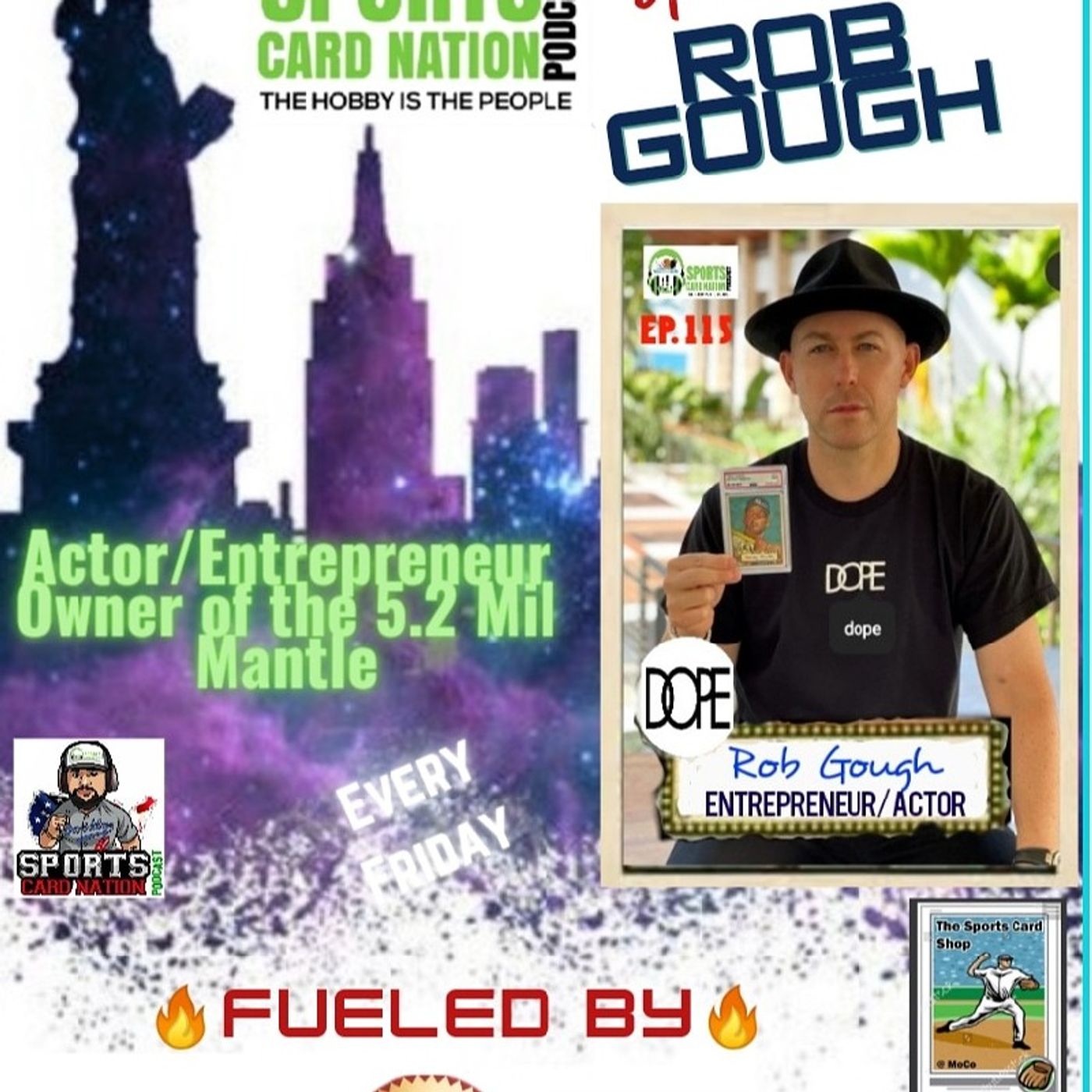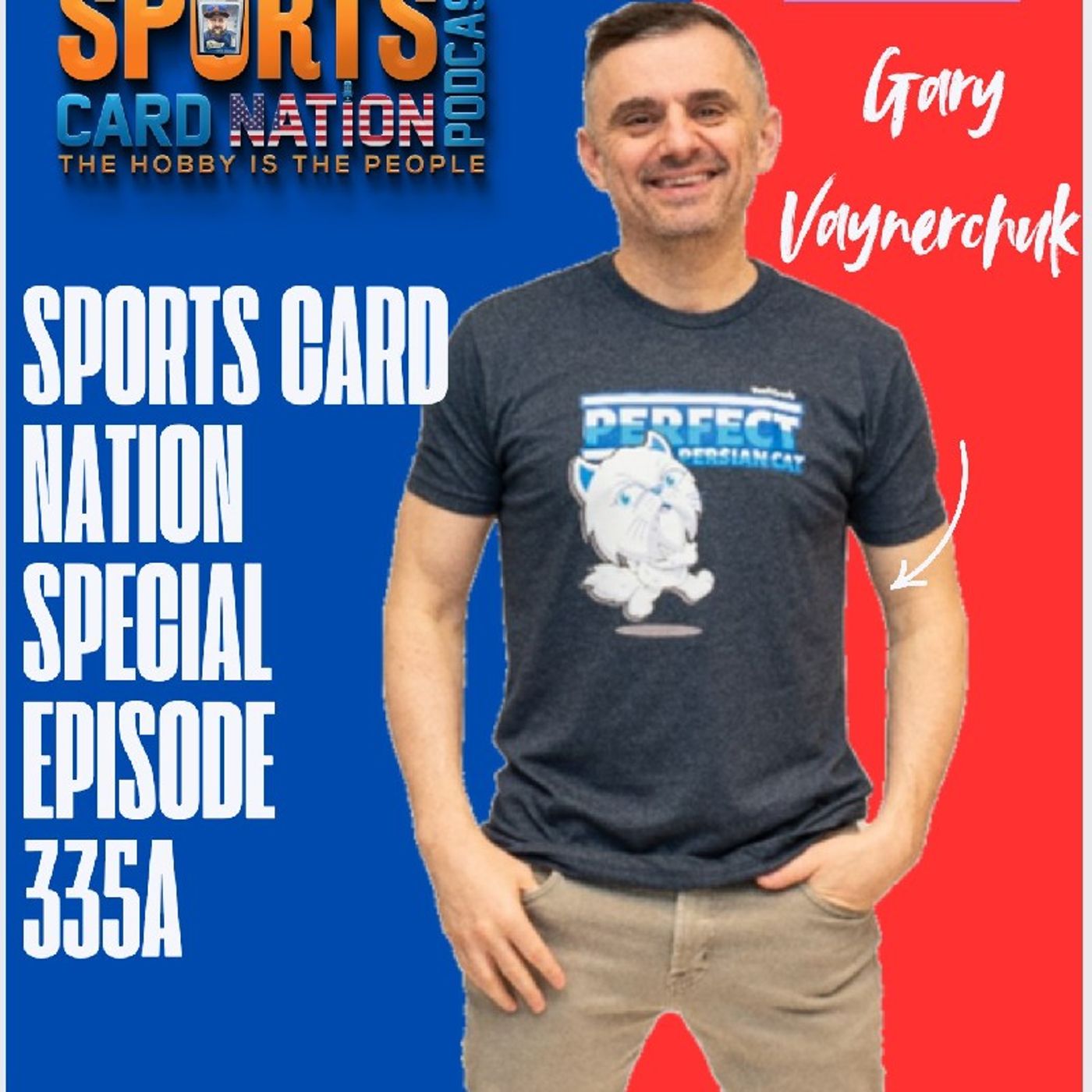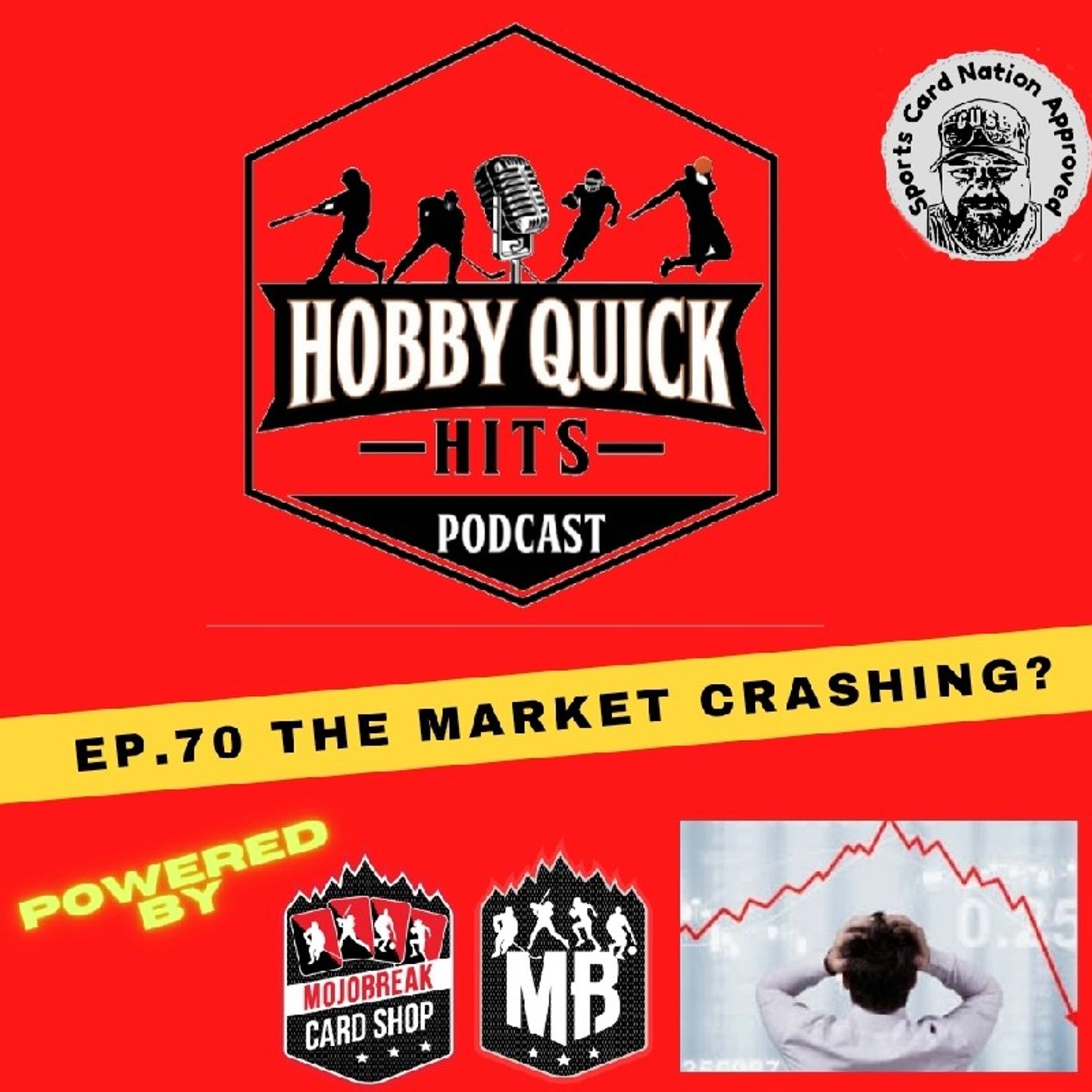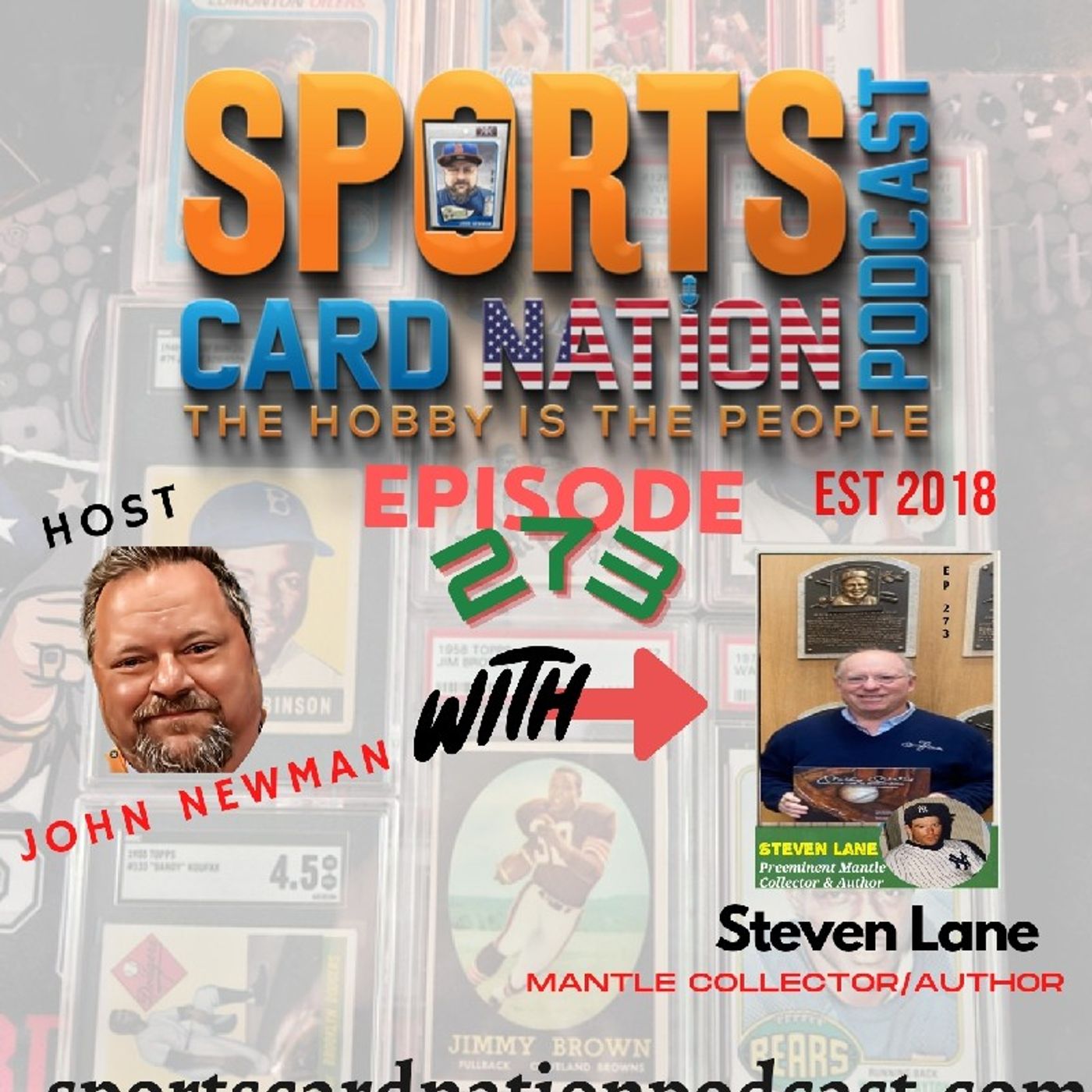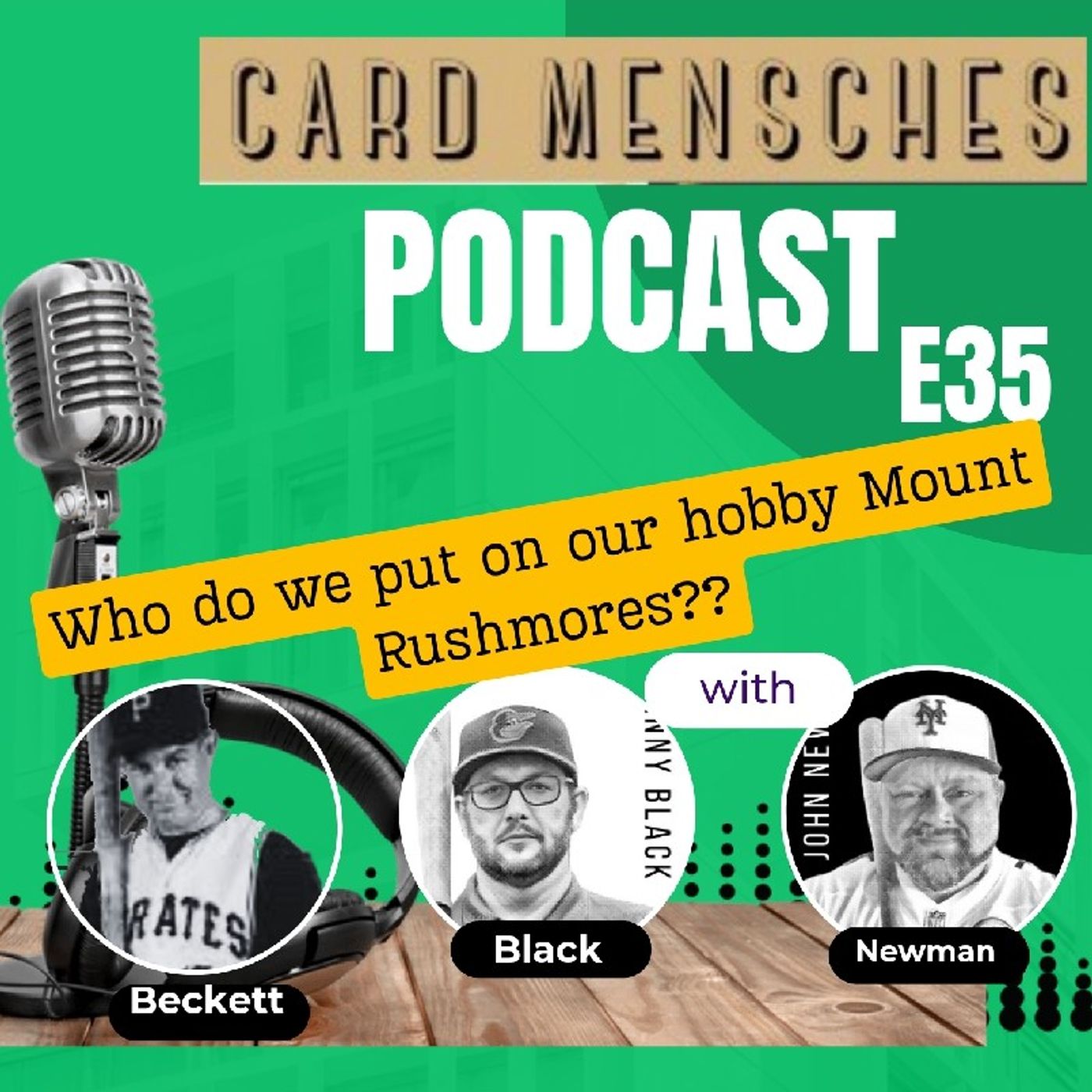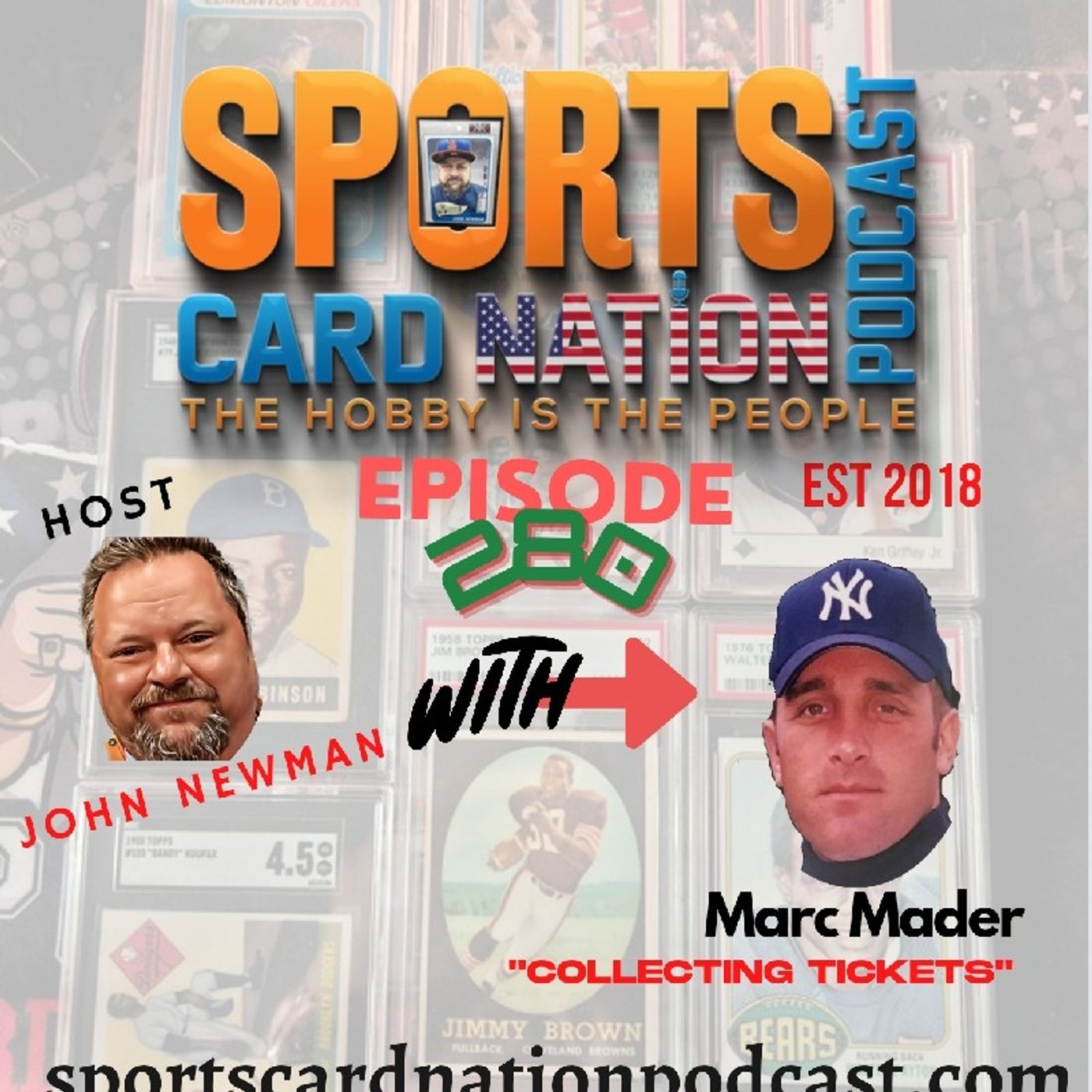Ep.259 w/ Marshall Fogel
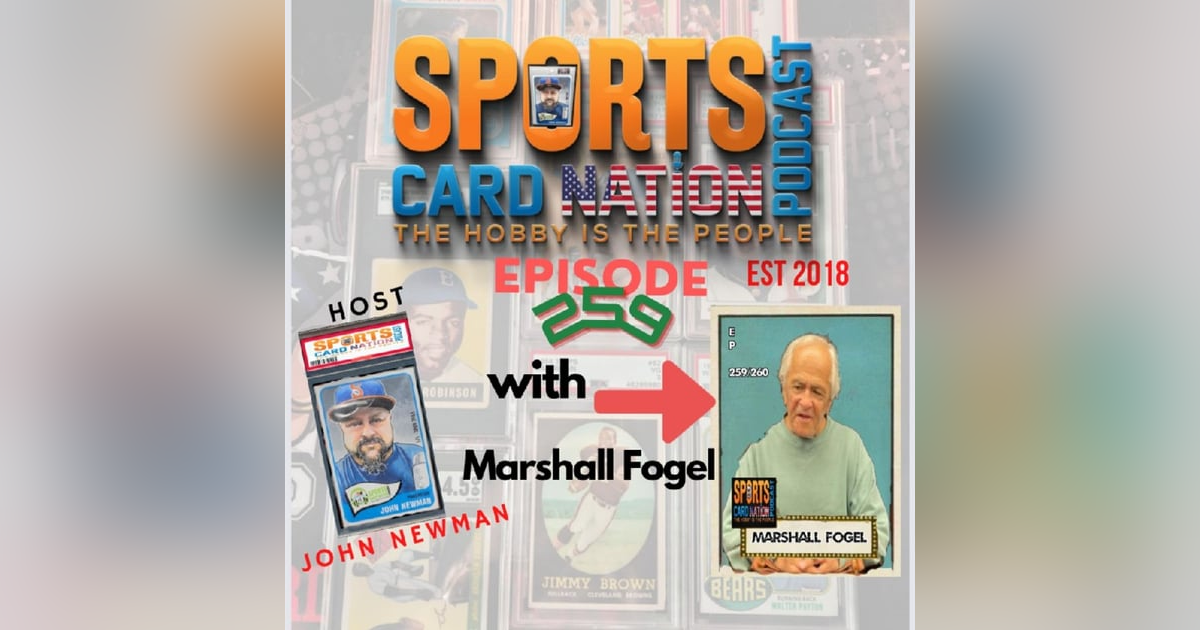
Legendary Collector Marshall Fogel joins us and nothing was off the table! Talking Points: *Having favorites? *Being open with the collection *Acquiring cards *Early grading discussion *The "I" word *The beginning of "The Collection"...
Legendary Collector Marshall Fogel joins us and nothing was off the table!
Talking Points:
*Having favorites?
*Being open with the collection
*Acquiring cards
*Early grading discussion
*The "I" word
*The beginning of "The Collection"
*Collecting Memorabilia with tips
Follow us on Social Media:
Website:
https://www.sportscardnationpo...
.com
https://linktr.ee/Sportscardna...
Follow us on Social Media:
Website:
https://www.sportscardnationpo...
.com
https://linktr.ee/Sportscardna...
Become a supporter of this podcast:
https://www.spreaker.com/podcast/sports-card-nation-podcast--4761791/support
.
SPEAKER 1: What is up? Episode 275 of Sports Card Nation. Excited as always to be back for another week and another episode really excited, for this episode. And so little back story about how this guest then is appearing on this week's show. And, this gentleman reached out to me to say, thank you for cleaning the Jefferson bird at grave.
SPEAKER 1: And he signed his email with his name and I instantly recognized who he was and, wrote back and, he gave me his number and we exchanged some texts and a phone call and I asked him, hey, you know, I would love for you to come on the podcast if you're willing to do it, and talk about your collection, the Hobby, things you like things, you don't like that sort of thing.
SPEAKER 1: And in these getting to know him through these small chats and text, you know, just, really enjoyed the conversation and, he agreed to come on and here is the part, one of that conversation with renowned collector Marshall Fogel. Many know him as the owner of one of the three PS A 1019 52 tops manal.
SPEAKER 1: But his collection is way, way more than that as most know, wanna give a special shout out to the vintage chat room I belong to on IG mentioned to those guys that I was just having martial art and got some great questions from them which I asked Marshall himself.
SPEAKER 1: So shout out to those guys doesn't do a lot of this type of stuff. So, really glad he made sports cod nation, you know, time for us here. So with that, we'll take a quick break and then we'll be back with Marshall Fogel.
SPEAKER 2: Iron Sports Cards is your number one source for all your PS A and other grading submissions. Their elite status improves turnaround times. Heck, they even provide the card savers. Their chat rooms, provide a dates on all your submissions.
SPEAKER 2: They also offer wax options and single cards to cover all the bases. Check them out on Facebook at Iron Sports Cards Group or on the web at Iron Sports Cards.com or even give them a call at 1877 Ironps A Rob's got you covered.
SPEAKER 2: Are you a new.
SPEAKER 3: Sports cars collector or someone returning to the Hobby? Maybe you're just looking for a friendly trustworthy Hobby community to hang out with and enjoy collecting Midwest Box breaks has been bringing collectors together for many years with affordable bras, helpful dreads and a discord group packed with generous people who genuinely care about the Hobby and other collectors check out the brakes at Midwest Box brakes.com.
SPEAKER 3: Our goal is to bring you as much value as possible. Also find us on Twitter at Midwest Box Springs.
SPEAKER 1: Also remember to check out Midwest Box brakes marketplace for brakes packs and single cards from over 300 trusted sellers apply to sell today at ISO dot GG forward slash Midwest Box breaks.
SPEAKER 1: All right, real happy and excited to talk to the next gentleman on the sports card shop guest line here on Sports Card Nation.
SPEAKER 1: Highly regarded collector, arguably probably the greatest collection, you know, currently. And, we're gonna talk about that and other things of the Hobby. I, I wanna welcome to the show, Mr Marshall Fogle. Welcome, sir.
SPEAKER 4: Thank you for having me on as a guest. I look forward to the interview.
SPEAKER 1: Well, I, I know you're a busy guy and, you, you know, I appreciate your time and again, you, you, you know, you could easily say no and you didn't. And I'm, I'm appreciative of that. Like I said in, in the intro there, Marshall, you have no one will debate that you have an awesome collection mu much of it, is known when you have such a great collection.
SPEAKER 1: Do you have like a favorite item or I, is that like asking somebody, you know, who your favorite kid is and like you love all your kids. Or at least most people do equally. How, how do you answer a question like that? Do you, does one item stand out above all or, or not necessarily?
SPEAKER 4: Well, I have many favorite items with the collection of the size that I have. I can give you some example, the 52 man card that's considered the Holy Grail. I have the only known real photograph by Carl Horner of the Anna Wagner image that's on the Keto six card.
SPEAKER 4: And lastly, I have a, a Lou Garrick Bat that he signed just before his death where he wrote to Jerry. May you take better advantage of this? And I did Lou Gehrig and it's kind of an emotional experience when you hold a, a game of Lou Gehrig with that inscription.
SPEAKER 1: Yeah. Yeah. No, no doubt. Speaking of the manual gem and 10, only three copies in the world we saw recently what a 9.5 sGC did I mean how do you hold your, you know, A PS A 10 to that?
SPEAKER 1: You know, not necessarily, you don't have to say, what do you think it's necessarily worth but you know, just kind of your thoughts on, on that sale in, in your card. I think the.
SPEAKER 4: Card is considered the Holy Grail for a couple of very valid reasons. One Mike Baker who was graded all three of the tens, wrote a letter saying that this is the best one. He also graded all the nines. And again said that the 10 that I have is the best one. And the reason for it is it did not come out of the rose and find that's not necessarily the reason, but it was caught in a pack.
SPEAKER 4: There are two types of metal cards, type one and type two. And that has to do with the, line underneath the, white part of the bottom of the card. And, so mine is a type one where all the rosen finds are type two, which has a little white spot on the, in the, blue, background.
SPEAKER 4: So, not that if there's anything wrong with the other cars, but, Mucho Orlando, who was president of, Collectors Universe, wrote a letter saying he also believed that this was the best. It's almost like, someone from heaven made the card and amazing that it lasted in such good condition for all these years and never was damaged in any way.
SPEAKER 1: Yeah, it's, it's like you said, it's, it's, it's one of the Holy Grail. There's not a ton. I, I in the Hobby. It's, it's right there. If not, number one, you know, arguably right. You know, II, I think it's, it's right there. We're gonna talk about one maybe coming, up to turn turnpike here. But, you know, you have a great collection.
SPEAKER 1: Obviously you're proud of it. You, you've talked about, you've talked about it. You've, you've shared some photos of that collection. We know a lot of other collectors are not maybe as open about their collections or they're more private about what they have and, and, and maybe don't have where does that? You know, why are you? I, I mean, I, I love the fact that you're open about it but why I guess would be my question.
SPEAKER 4: Well, I've always had a community spirit.
SPEAKER 4: You know, I, I served as a member of the Demian Health Board, Father Woody Homeless Shelter and a lot of other charities. And I believe in community response. In other words, I like sharing it with the community such as displaying at the museum at Yankee Stadium. I did the all game when Atlantic lost the all-star game.
SPEAKER 4: And I have also displayed it in many museums. So basically, to be honest with you, I get a real thrill and a kick out of letting other people enjoy the collection. And so I enjoy sharing it. Ii, I respect those who want to keep it in private. But on the other hand, I call my collection, the Hall of Legends.
SPEAKER 4: And I know that people who've gone to Cooperstown and also seen parts of my collection really believe that it's a lot easier to come to Denver, Colorado than it is to go to Cooperstown. And I have a lot of nice items to share with the public and, like I said, I enjoy it.
SPEAKER 1: Yeah. And, like I said, I, I appreciate that fact. Right. Cards are meant to be, seen and enjoyed whether they're your own or you can see someone else's awesome collection.
SPEAKER 1: Obviously, in, in your case, you know, when it comes to acquiring a new item, whether that be a baseball card or, or a piece of memorabilia, is it generally through auctions that you do that or do, do you get people who will call you up like via maybe a private sale and say, you know, hey Mr Folk, I have this, you might be interested in it. You know, how do you go about obtaining, adding to your collection?
SPEAKER 4: Well, it's an evolutionary process and part of it has to do with it. I believe I had a genetic addiction to collecting, you know, like I always was a child, like to buy baseball cards for a nickel pack. And also I like collecting comics.
SPEAKER 4: I destroyed all of that, like handling it. But, you know, I came from an environment where, you know, I had to work hard all my life and I worked construction and I left the house with a law degree and a license with $200. So, I just, I, I made it on my own and, that's part of why I like sharing it with other people that couldn't afford as I can now to own all this stuff.
SPEAKER 4: So as far as being more direct with your question, basically, it started with me going to Chicago in 1989 with my family and I knew about the National convention there and that's so I really got hooked, but, you know, you could buy cars for $2 a piece.
SPEAKER 4: This is before the authentication services sprang forward. And, you know, I, I just, I kind of had a genetic nose to what to collect. I didn't know a lot about baseball history. And so, after I left the show, I studied a lot about baseball history and learn what to collect.
SPEAKER 4: And so I basically was found out by dealers and they would call me and tell me what they wanted to sell. And then I took S CD trader trader issue and waited for fedex to come and then make phone calls to buy stuff. So in the beginning, I was contacted by phone and also make calls to start to collect.
SPEAKER 4: And then I started going to shows, and talking to dealers and learning a little more about how to collect. And then around 2005, 2006, the internet started to become more of a vehicle to collect and then, it sprang into what we have today where you can, you know, make bids go on ebay and use the internet, and catalogs and, and the iphone to collect.
SPEAKER 1: Yeah, no doubt. And, and like you said, I read, a previous interview you did talking about kind of your early start. And obviously before grading, was in full bloom and, you know, unfortunately, buying cards that later turned out to be trimmed.
SPEAKER 1: And that's why I tell people that the grading, card industry is, is, is so important, to the Hobby and the industry because it, you know, it proved provenance, proves authentic authenticity.
SPEAKER 1: And, and obviously, while it's subjective, it also gives a, condition grade, of said cards. And, you know, I know you try to stay in the, the 89, 10, as far as graded cards, if you can speak to a little bit of that. And do you have any cards that are not graded or is all your collection, of the graded variety?
SPEAKER 4: Well, the history of the Grady system, started around 1996 when David Hall who became the president of Collectors Universe, had a collection of cards. And, there was a fellow named Alan Hager who invented the holder and a Alan Hager was, a genius in that since, he kind of fell to the side.
SPEAKER 4: And then David Hall bought the patent rights for $50,000 for the holders that hold baseball cards at the time or any kind of card, whether's non sports or other sports. So that launched the whole idea of authenticating cards. One has to remember the re there was, it was ok to trim cars back when it was a Hobby.
SPEAKER 4: There were, there were, trade magazines and, different trade journals that would say these cars are beautifully trimmed. So there was a point in the early days before trading that it was ok to trim cars, they were worth not a lot of money.
SPEAKER 4: People that collected would go to your house and they sit in the basement and they trade cars and trim them and great and had a lot of fun.
SPEAKER 4: Well, then it, of course, grew into, I, you know, a monster when David Hall, decided to sell his collection under pressure because people didn't want him collecting and grading cards because of course, he could grade his own cards subjectively and he was smart enough to sell his collection and, and launch this whole idea of grading cars which every dealer hated.
SPEAKER 4: They didn't want to lose the opportunity for themselves to grade cars. But over time it caught on because there had to be some format, some formal way in which to, grade cars where everybody had confidence in the grading system.
SPEAKER 4: Yes, it is subjective, you know, what's the difference between an eight and an 8.5 and an 8.5 and an I, well, you know, when you have now two graders, when it all got started, they have probably over 100 graders that see things differently.
SPEAKER 4: So, but overall my view of it is, it's a good system. There are competitive grading services, that, grade cards there, some that I don't even know who they are, but each person has to find confidence in the grading system.
SPEAKER 4: And obviously Ds A top of the heap in terms of a difference in what they call an eight and what another grading service calls it A, it may be the same, but the reputation of PS A seems to bring more money for the cards.
SPEAKER 1: Yeah, no doubt. I, I know you mentioned them. I think you answered this question a already it was one on my list. But I, I'll ask you just to, just to confirm you mentioned what Mike Baker. I see his, his, hologram, his holographic sticker on some of, a few cards in the collection is that to cer certify that he, he graded it. His eyes were the one that, you know, graded the card.
SPEAKER 4: Well, I'm gonna go back a minute. Yes. If I have ungraded, if I have ungraded cars, I forgot to answer that I do.
SPEAKER 4: I have a pretty good eye by now. And some of the cars that I have that are great are mostly some commons, but I, I just don't feel like I wanna spend the money to grade them.
SPEAKER 4: Yeah, but I don't have a lot of them, but I, we have, some that are ungraded as far as Mike Baker is concerned. He's son of the father of grading. And, he came to me with an idea of the sticker instead of having to remove the card from the holder and regrade it. If you have an eight, and it's outstanding, then you get either gold or silver or, or with the, the black sticker on it.
SPEAKER 4: And I, he asked me if I buy into that, I don't mean financially but emotionally and I said, sure. Ok, so he came to my house just be while he was launching this service. And I became his poster boy and I really believe in what he's doing and obviously it's working, it's time for a quick break, but we'll be right back for more than 30 years.
SPEAKER 6: Robert Edward auctions has been the nation's premier auction house specializing in sports memorabilia and trading cards with significant experience and expertise in all major sport, non sport and Americana collectibles.
SPEAKER 6: Re a has helped clients achieve record breaking prices for their items and has done so with a reputation for integrity and transparency by actively partnering with collectors and enthusiasts throughout the entire process. Re a has created the Hobby's most trusted forum for selling high quality collectibles. Go to Robert Edward auctions.com for more information on how to buy or sell in their next auction.
SPEAKER 6: Let's go.
SPEAKER 5: You are listening to the Sports Card Nation podcast.
SPEAKER 1: You know, a, a hot button topic or a hot button question. I don't even think it's a question, Marshall to, to answer sort of my own question is, you know, people like to say, well, cards can't be, an investment and I will always argue that sure they can.
SPEAKER 1: You don't have to do it for that reason necessarily. And if you do, there's nothing wrong with that, that either. But for someone to say, you know, cards are not an investment class. I think we've seen what some of these cards, have went for and you cannot, you know, when you look at that, II, I don't even think there's an argument.
SPEAKER 1: You're a lawyer. So I'm gonna, acquiesce to your, your expertise and, and a hobbyist. You know, when someone says, well, you know, sports cards are not an investment. How do you, how do you respond to, a statements, such as that?
SPEAKER 4: Well, it's a tiered system, you know, when I started collecting as a little kid, it was a Hobby. You know, you didn't care about setter and creases and you just had fun with it. So, I've been through the whole evolution of it from just being a child and enjoying it and having fun.
SPEAKER 4: Then it got to be where I enjoyed it, just collecting, not knowing that it would be worth a lot of money. And then it's morphed into this whole thing about being a an investment where it becomes profitable if you know how to collect.
SPEAKER 4: So look, I've always said that people like me, maybe there's a small percentage that will have the ability to collect the high end investment grade cards. But what sustains the whole industry is the massive amount of Vin cards where people can spend $50 on a mantel or spend 12 million on a mantle. So there's room for everybody.
SPEAKER 4: But if it was just an investment class, this thing never would have grown. Basically, the whole industry got started in my opinion. And this stuff wouldn't be worth it is today. It wasn't for Bill Mastro and, and, and Al Rosen. If it wasn't for those two, this stuff wouldn't be worth anything like it is today.
SPEAKER 1: Yeah, definitely catalyst. As you just pointed out, I won't disagree.
SPEAKER 1: There at, at all, you, you mentioned 89 that, that go into that National kind of a, a two prong question. Was that your first National? And do you try to make a point to get to everyone?
SPEAKER 4: Oh, that's an easy answer to both of your questions. It was my first National. It was in the basement of a hotel. I think it was a Holiday Inn. But II I, my memory might be compromised on that. But I remember going down there and I was saying my gosh, all this stuff, you know, and I didn't know, I thought Ty Cobb at the time might have been a dress designer that, but I knew that I, I, was gonna get hooked on it.
SPEAKER 4: And, and so I bought a bunch of stuff. They were all ungraded. Some of them were good. Some of them were bad and some of them were ugly. The first card I bought was a 53 Mantel Tufts card and it turned out to be trim. So I wasn't up to the greatest start in the world. But I remember going to that National and I knew about Al Rosen and I knew about Bill Mastro, but I was so intimidated.
SPEAKER 4: I was afraid to introduce myself. I'll never forget a wee laugh about that when later on when I became friends with both, both Laval and, with Will Mastro and I did go to a lot of the nationals and they were fun because in those days in order to get the stuff, they, most of the dealers would save the good stuff. I put that in quotes for the National.
SPEAKER 4: That's not true today that a lot of a lot of, of the, desirable items are sold privately. Now, a great many of them are in auctions and, that answers the first part the second, I don't go to the shows anymore because it's not so commercialized now.
SPEAKER 4: And, some of the venues are so miserable, like Rosemount Cleveland. You know, it's because they were cheap, but now they have new ownership of the National and I think they're gonna try to go to cities where you can like Denver or Las Vegas or somewhere where you can do other things.
SPEAKER 4: You can go to shows. You can, you can go on tours, you know, there's something to do. So I haven't been to a National probably in five years because this is really not for me to do there and that there's nothing for me to really see that I would like to buy.
SPEAKER 4: I would go there because a lot of people want me to go there because they want to meet me and talk to me about it. But that, that's the drawback that I wish that someday I might go and just hang out and sit there and get to talk to people and get interviewed and I would enjoy that.
SPEAKER 1: Yeah. Yeah.
SPEAKER 1: I understand.
SPEAKER 1: You know, when you got back, you mentioned 89 you kind of started again. Obviously, you, you mentioned collecting as, as a kid.
SPEAKER 1: Were you, did you jump right into the memorabilia side or did that something that kind of came after, getting back with the cards.
SPEAKER 4: Fortunately, I jumped into it right away because I always thought that if you collect baseball bats, that's a weapon, it's no different than going to the New York Metropolitan Museum and seeing, bows and arrows and lances and swords and, and, all that stuff. And in my opinion, the baseball bat is the weapon of the player.
SPEAKER 4: I'm not necessarily the pitcher, but that's what makes you great. How do you take a stick and hit a ball 90 miles an hour when they throw a ball to me at 90 miles an hour, I can't even see it. I don't know how they hit that. And I always wonder when you play golf, you have to be quiet.
SPEAKER 4: You know, they, they put the ball on the tee. You'd think it'd be the opposite. You'd be cheering because when you hit a ball with a stick and everybody's cheering, you always think, well, why, why aren't they being quiet? So, it's kind of fun to think about it in that way. But, I, I always enjoyed starting to collect memorabilia like baseball bats.
SPEAKER 4: I love photographs. I really got into that. My, my view of collecting is when I, when it was possible, I always collected when people weren't interested in the subject. And that's how I was able to get things that I wanted that I felt were valued emotionally and financially.
SPEAKER 4: So I wasn't paying the money when it became popular to collect and the demand became greater than the supply.
SPEAKER 1: Yeah. And you, you were kind of ahead of your, your, your time if I, if I may say, you know, so another thing and I'm preaching to the choir here, I'm sure with, with bats, especially bats of vintage ever players in comparison to today today, a player gets 4050 bats made, can, can have an order, probably overnighted to him the next day if they need 1020 more bats.
SPEAKER 1: So there's, there's obviously a lot more, bats in today's game available than the vintage. Many cases. You, you hear that, you know, a player used the bat for, for a whole season unless one did happen to break and then they got another one.
SPEAKER 1: So there are, there's obviously a lot less of those bats from, from this generation of the game, compared to today's and, obviously that factors in, into the value and what things go for. I'm sure you agree with that.
SPEAKER 4: I do and I, that brings up the whole issue of how do you collect bats and, game use bats particularly. That's what I collect. I, I, I'm very much against grading bats. I think that's just a ridiculous thing to do. I'll give you an example, maybe what, 25 Ty Cobb game use bats in the world or maybe three or four. Sandy Colfax game use bats. Now, my Sandy Colfax bat has a 10 marker on it.
SPEAKER 4: Well, he couldn't hit a basketball with a bat so there's not a lot of game use on it, but Ty Cobb, you know, maybe gets a three and there's only 25 of them. You can't grade bats, you can only grade the characteristics. Is there is a fault Mark on it. Is it side written? Is it got nails in it because you were allowed to do that because they had to use the bat the whole season.
SPEAKER 4: You know, when you call Garrick Ruth DiMaggio, Colfax, which is, or the rare bass like, Hack Wilson and so on. It's just not a lot of them and, you know, you get involved in the grading.
SPEAKER 4: I, I just think it's nonsense in my opinion.
SPEAKER 4: It's, it's the same thing if you buy a Lou Brock bat for $10,000 because he hit a home run or you buy one for 1200. What do you care if Lou Brock hit a home run with the bat? No, Lou Brock is not a first year Hall Of Famer or, or, so some of the other palm monitor.
SPEAKER 4: It's just to me you're wasting your money, you know, put your money in the value in a Garret Ruth Cobb, Greenberg Ginger, some of those bats, Yogi Berra and the Duke Snyder and so on. Waiting for. That's where you wanna.
SPEAKER 4: Don't worry about the, the, all this stuff about, grading. Look at the characteristics of the bat. Don't worry about a pitcher bat if it doesn't have a lot on it, use your mind and, and, and, and use common sense, common sense is the key to collecting.
SPEAKER 4: Secondly. Yeah. Go ahead. We'll get into it later on lo a but I'll wait till you ask me about this.
SPEAKER 1: Yeah. And listen, the Dodgers weren't paying Sandy Koufax to hit home runs. I, I think we both, I think everyone can, agree on, on that. So, that's why, again, there's not a lot of wear and tear, on those paths. Well, you, you brought it up.
SPEAKER 1: So let's, let's talk about that with, you know, we've seen things in the industry, the Hobby where, fakes, have been discovered, after the fact, unfortunately, in, in some cases, you know, you know, with a game, use bat or any equipment that's not just relegated to bat, could be a glove, and, and, and other, uniforms obviously, how difficult is it to authenticate?
SPEAKER 1: And I know, in, in, in knowing about you that's very important to you. You, you obviously, don't want an item that, is not the, the real mccoy or, or genuine. So, kinda, you know, you, you brought it up so we'll, we'll segue right into, you know, authenticity.
SPEAKER 4: Well, II, I don't think they should call letters, letters of authentic.
SPEAKER 4: They're not, they're letters of opinion. You can have 10 people in a room and have 10 different opinions. So, I'm, I, I think that's what they should call them because they're not guaranteeing anything that, that letter is only what that one opinion thinks it is. And so you really have to understand who's authenticating this stuff. What is their background? What is their education? What is their knowledge?
SPEAKER 4: And, and how accurate are they?
SPEAKER 4: So again, read the lo A letters if it says in there, this is that it's not ABC or D. So it must be real. In other words, that's called the rule of exclusion, don't buy it, don't buy it. That, that, that, that's not a science. I, to check with the people that are scientists, the rule of exclusion that they use on saying that it must be real.
SPEAKER 4: If it isn't five other different things, it's just not a science and it's not, it's, it's not an accurate way to collect. Secondly, if it says the circumstances point to the fact that this is really a true game used item, don't buy it because that's, that's smart.
SPEAKER 4: It, or if it says it's possible, what you use is what the US Supreme Court is used in the case, is it substantially true? Do all the facts point to that.
SPEAKER 4: This is real. So you use a high standard when you collect memorabilia. The second thing is the auction house is not responsible for telling you if it's real.
SPEAKER 4: They take the position. If they have an LO A, that's all they have to do. It's up to you to decide if you're gonna spend $20,000. You, you better make sure that you've got all the right information to make sure that it's real. And it's not been marginalized by, by, by lack of your knowledge or relying on, on on LO A that may be compro in this content.
SPEAKER 1: Yeah. Good advice for sure. And, and like you pointed out, especially with some of these items are, are going for you, you definitely want to do your homework. Your research, lean on someone who maybe is more knowledgeable than even yourself, maybe not in your case. But for someone else, even in that sort of thing.
SPEAKER 1: All right folks, we're gonna stop the interview right there. Keep this episode at a reasonable length, something we're trying to do on this program, keep them under an hour when possible. So rather make one big long episode, we're going to make this two parts. So this was part one, part two will be next Friday, December 1st. If you're scoring at home.
SPEAKER 1: Again, it'll be a, a shorter last episode that way. We broke them up into, two parts and a lot more interesting conversation, in the second part, as well. So as, Marshall's, definitely an interesting guy. So, we're gonna have a few, we're gonna have our Hobby is the people announcer, next in couple closing thoughts and we'll be back next week on the show with part two, with Marshall Fogo.
SPEAKER 5: Time for our Hobby is the people announcer of the week.
SPEAKER 7: Hey, what's up? It's your boy Kob at Mr Kob on Twitter. And remember the Hobby is the people.
SPEAKER 5: If you'd like to be the Hobby is the people announcer of the week, do a WAV or MP3 file and send it to Sports Card Nation PC at gmail.com.
SPEAKER 8: That's a wrap for this week. Huge thanks to you, the listeners out there because without you, there is no ice.
SPEAKER 8: If you like the show, we truly appreciate positive reviews. Big ups to our great guests who drive the show and our awesome sponsors who make it all possible. Sports Card Nation will be back next week but don't forget to catch either Hobby quick hits or cod mentions coming up on Monday.
SPEAKER 8: I'll leave you with this.
SPEAKER 8: How do we change the world?
SPEAKER 8: One? Random act of kindness at a time.
SPEAKER 8: Remember the Hobby is the people.
SPEAKER 6: For nearly 50 years. Sportss collectors Digest has been the voice of the Hobby. Bringing you comprehensive coverage of the sports collectible industry from industry news, auction results, market analysis and in depth stories about collectors and their collections. Sports collectors digest has everything you need to know about the Hobby.
SPEAKER 6: S CD also your leading source for listings of sports collectible dealers, card shops, card shows and the latest from the industry's top companies to check out all the latest news or to subscribe to the Hobby's oldest magazine. Visit sports collectors, digest.com or call 1 808 29, 5561.
SPEAKER 9: Hobby hotline is the Hobby's only live interactive call in show. Join some of your favorite Hobby personalities every Saturday 11 a.m. Eastern. 8 a.m. Pacific and the first Tuesday of each month at 9 p.m. Eastern to discuss the hottest Hobby topics if you miss us live, catch us after the fact on all major podcast platforms. Follow us on socials at Hobby hotline.








